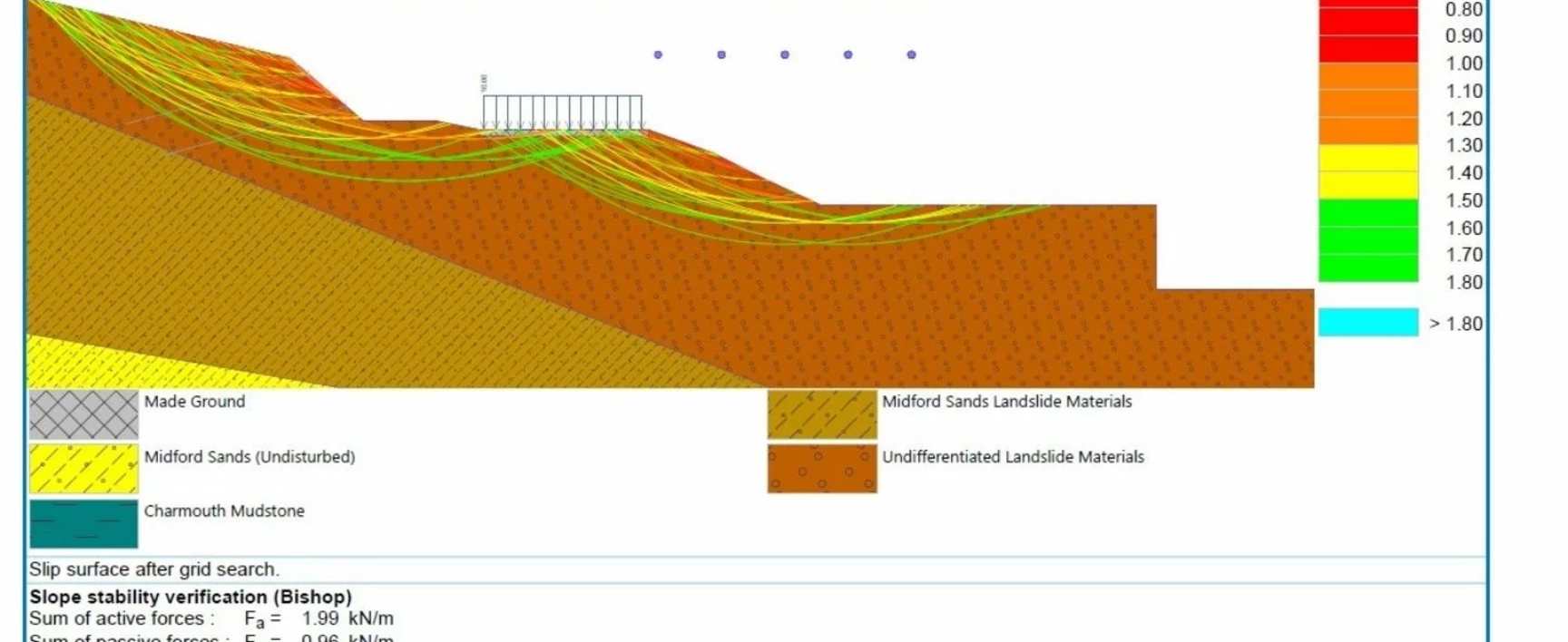Our GI Specialists team provides expert guidance through ground investigation, delivering safe, reliable solutions to complex geotechnical challenges.
Our GI Specialists team can provide support and assessment from many different perspectives. Filling the knowledge voids in your organisation and providing safe reliable solutions to real problems. With the spirit of collaboration and our “can do” approach we will help take your project to the next level.
From project planning and support, desk studies, through to geoenvironmental and geotechnical assessment our teams can support you at every stage of your project. Ready to provide advice and offer solutions as the project progresses. For many soil mechanics and geotechnical engineering can seem like a black art. Unlike structural design geotechnical design has many uncertainties, and an unending array of techniques and methods which can be bewildering. Our geotechnical specialist team can guide your project through this minefield to the conclusion you are seeking providing compliant cost effective solutions.
Our technical team are a highly qualified group of engineers who have decades of experience within the geotechnical industry. Each member of the team brings their own specialism to the team which when seen as a whole provides an unrivalled array of skills which can be bought to bear on the multitude of challenges which confront our industry.
Our experts are able to deliver the following:
Desk Studies / Tier 1 Assessment
Includes information from Groundsure, Mining Remediation Authority (MRA) and other relevant bodies.
Including site reconnaissance in accordance with BS 5930
Find out why you need a desk study:
BS 5930 and LCRM require that the first stage in any development should be a desk study and site reconnaissance. It is important not to miss out the desk study as the first phase of any site development. Much can be obtained pertaining to the site and its environs. Money spent on this phase can reap benefits later down the development process where both time and money become more critical.
The desk study should include gathering information of any potential hazards which the site might impose, for this to be effective it should include information concerning the past use of the site and any potential contaminating events or uses.
Information concerning the topography, geology, hydrogeology, environmental and ecological constraints.
The information should be used to develop a ground model highlighting areas where there are gaps in knowledge which might impact the development thus enabling the investigation phase to be designed.
It is essential that this element of the work is conducted by a team such as our geo-specialists who have expertise across the full range of potential hazards posed by any site as well as a full knowledge of the methods of investigation which might be adopted to provide focused information to complete the ground model. This should include the geotechnical information to enable the parameters required for the geotechnical design to be obtained.
Our desk studies will not only provide a factual account of the information from various sources but will also include advice and interpretation of the information gathered with respect to the proposed development. Thus ensuring the next phases are focused and pertinent.
Project Support
Preparation of project specifications/ scoping ground investigations
Full risk assessment setting out areas of concern related to geology , past use geotechnical hazards
Managing and supporting investigations - our team can design your investigation to ensure it will provide the necessary information required
Our team provide full support from procurement to design stage and beyond.
Planning support
Factual and interpretive reports (GIR and GDR) find out what a GIR and GDR contain:
GIR - The Ground Investigation Report is primarily a factual report and should contain details regarding the site location and the expected geology and a comparison with the geology encountered by the investigation. The report should include the desk study, all findings from the investigation in terms of logs and other site records. The results of all testing both conducted in the field and in the laboratory. Full descriptions of the soils, obtained by logging of samples by a qualified and trained logger.in accordance with the terminology set out in BS 5930. At SOCOTEC we train all our engineers to this standard on the renowned SARD course.
GDR - the geotechnical design report is primarily an interpretative report compiled using the factual data provided by the GIR. The report will discuss the ground conditions in relation to the proposed works and offer advice regarding foundation types design of slopes and retaining structures and other works associated with the proposed development which require an understanding of the ground and its properties.
Foundation assessments:
The foundation assessment should consider the proposed structure and provide an assessment of the various foundation solutions which might be adopted, with respect to the ground conditions and the parameters obtained from the ground investigation. This assessment might include examples of the allowable bearing pressure and settlement which might be expected from the soils which might form the founding medium, such as shallow foundations and piles. Where piles are considered an assessment might be made of the constraints the ground might impose, the predicted working loads of piles of various lengths and diameters as well as the various types of piles which might be appropriate for the development.
Geoenvironmental Assessment
Stage 1 (Tier 2) Risk Assessment reporting in accordance with Environment Agency’s (EA) Land Contamination Risk Management (LCRM). To find our more about geoenvironmental assessments:
Stage 1 reporting in accordance with LCRM is required to establish and assess the risks posed by potential contamination on or near to a site. Tier 1 is carried out as part of the desk study / site walkover process.
Tier 2 reporting is considered a Generic Quantitative Risk Assessment (GQRA), which involves testing the Preliminary Risk Assessment (PRA) developed as part of Tier 1, via intrusive investigation and findings, including chemical testing data of soil, leachate or groundwater and ground gas monitoring information, in addition to other channels of information. Findings are measured against published Generic Assessment Criteria (GAC) to indicate if a site is above or below the recommended threshold for contaminants to pose a risk.
It should be noted that Tier 2 GQRAs cannot be carried out before Tier 1 is completed.
Geotechnical Assessments
CD622 reporting to National Highway standard:
CD622 Managing Geotechnical Risk reporting is required where works are in close proximity to the National Highway (NH) network. The reporting must be conducted as prescribed by NH and reports are required to be submitted in phases for approval before advancing to the next phase. A Statement of intent (SoI) should be compiled followed by a Preliminary source study report (PSSR); these reports are used to compile the Ground investigation scope report (GISR). Once approved the ground investigation may be conducted and reported in the Ground Investigation Report (GIR). The findings of the investigation are then used to compile the Geotechnical design Report (GDR). Once the works have been completed the Geotechnical Feedback Report (GFR) is then compiled providing an overview of the works and any deviation from the risk register or other events which influenced the work which were not foreseen. The whole process must be overseen by a RoGEP Adviser approved by National Highways. Our geotechnical specialists group is made up of a number of NH approved advisers and engineers with experience to navigate through the requirements.
Ground characterisation / representative values:
Representative values are required by Eurocode and are used to describe the behaviour of strata which are present at a site. In order to characterise the ground it is necessary to first understand the various zones / geology beneath the site. To do this requires very good soil and rock descriptions and appropriate testing required for a particular design. In order to choose the representative values we will divide the strata into zones of similar properties from this we will determine a suitable representative value for a particular parameter. This choice will take account of our knowledge of the strata from previous work, the nature of the tests performed and the soil state at the time of testing. We apply a good deal of subjective assessment to this process to arrive at the recommended values.
Foundation type advice and design parameters:
Part of the design process will require looking at the various options available for a particular problem we will provide assessment of the various options and discuss their pro’s and con’s, the impact of the solutions in terms of both practicality and economically advantageous methods. Optimising the choice of parameters related to the characteristic values.
Preliminary Foundation assessments (shallow and deep):
We can help decide what foundation type might be suitable for your project. Usually the decision will be made moving forward to design and build however we can provide a rationale regarding the advantages and disadvantaged of shallow foundations or if the ground is unsuitable for these, the type of piles which might be suitable as an alternative. We can provide examples of foundation sizes, depths and types and their load carrying capacity as well as making assessment of the typical settlement which might be experienced. The assessment may be used to guide decisions regarding the use of deeper foundations. For deeper pile foundation we might provide guide loadings for various types, depths and diameters of piles, further informing the decision making process.
Basement Impact assessment:
Where basements are being installed beneath existing buildings the basement excavation requires very careful consideration. There have been several significant failures whereby the excavation has cause significant distress to adjacent buildings in a terrace and in some cases buildings which are in close proximity but not adjoined to the development property. In order to ensure the new build does not adversely affect any surrounding structures it is necessary to conduct a basement impact assessment. This included defining where the water table lies and the properties of the soils within the locality. The parameters required are soil stiffness and strength values together with soil particle size density and classification properties will need to be determined on high quality samples. Armed with suitable parameters a finite element analysis can be conducted to assess the impact the construction will have on adjacent structures. By conducting the analysis in stages preconstruction the method can be used to determine the most effective way to go about the build and what measures will be needed to prevent unnecessary movement.
Retaining wall and slope stability analysis:
Do you have aging retaining walls or looking to incorporate them into a new build. We have analysis programmes which enable us to review the stability of retaining structures. Our team are able to design and conduct investigations to provide parameters which are then used in the stability checks. Similarly we are able to provide analysis of slopes either natural or constructed.
NHBC compliance:
An understanding of the NHBC guidance is essential for domestic residential construction works. We can both conduct reports and advise on compliance with the guidance, including pavement and road construction, design and suitability of soakaways, foundations and earthworks as well as the recommendations when working near trees. Our geoenvironmental team can advise on the necessary requirements to deal with contaminated land.
Finite element analysis / finite difference analysis:
We can conduct finite element and finite difference analysis of both structures and geotechnical situations. These assessments require good quality data to provide meaningful analysis. We can guide the process from concept through to analysis providing investigation and testing designed to deliver the parameters required and then conduct the analysis to assess stress and strain distribution as construction proceeds and into the final product.

Meet our GI Specialists Team

Let's Talk Geoenvironmental and Geotechnical Solutions
Get in touch with our GI Specialists team to discuss how we can support your project through expert interpretative assessments and guidance.









